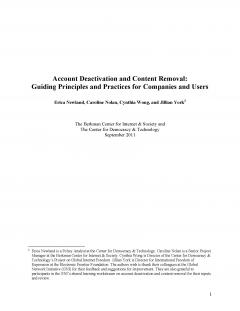In
partnership with colleagues at the Center for Democracy &
Technology, the
Berkman Center is pleased to release a report on “Account
Deactivation and Content Removal: Guiding Principles and
Practices for Companies and Users” byErica Newland,
Caroline Nolan, Cynthia Wong, and Jillian York.
This
report explores these dilemmas and recommends principles, strategies,
and tools
that companies and users alike can adopt to mitigate the negative
effects of
account deactivation and content removal. Through case examples, we
outline the
ways in which platform providers can have a positive impact on user
trust and
behavior by being more clear and consistent in developing ToU and other
policies, responding to and evaluating suspected violations, and
providing
opportunities for recourse and appeal. We also highlight concrete
actions that
users can take to educate themselves about how the moderation,
takedown, and
abuse-prevention mechanisms work for the services they use, provide and
communicate context where necessary, and engage with companies and
other users
around such issues.
From the activist who communicates with
her network via
her Facebook account, the user who posts documentary-style videos to
YouTube or
the citizen journalist who raises awareness with photos uploaded to
Flickr, platforms that host user-generated
content are increasingly used by a range of civic actors in innovative
ways: to
amplify voices, organize campaigns and coordinate disaster response,
and
advocate around issues of common concern. However, while the online
space may
be perceived as a public commons, private entities play a role in
shaping
online activity, behavior, and content via Terms of Use (ToU),
community
guidelines, and other mechanisms of control. Platform providers often enforce such rules in response to
potential
threats, misuse, or ToU violations; users must observe
them or risk losing their accounts, their contacts, or their
ability to
post content.
The
clarity, transparency, and consistency of how such terms are
established and
implemented are important to all users, but for the growing
number of human rights activists who depend on web 2.0 platforms for
core
elements of their work—and for whom removed content and deleted
accounts can
have severe consequences—the
stakes are much higher. For platform providers, enforcing site
guidelines can require
balancing complex and often competing considerations, including
supporting
community norms and innovative user activity, while maintaining a safe
and
secure online environment, protecting the free expression and privacy
rights of
users while enforcing legal standards or responding to government
pressure, and
accounting for the potential risks faced by activists.
This
document grew out of an ongoing
learning series hosted
by the Global
Network Initiative(GNI), of which the Berkman Center andCDT are
founding members. Our analysis was strengthened
by
the experience and feedback of diverse stakeholders,
including company representatives,
socially responsible investors, academics, and advocates, and intends
to offer realistic
and concrete approaches that are rights-sensitive while also flexible
enough to
be practically implemented across diverse platforms and contexts.
For more information on the Berkman Center’s work with the GNI, and on issues related to online free expression and privacy, please visit: http://cyber.harvard.edu/research/principles.
Additional announcements can be found at:
